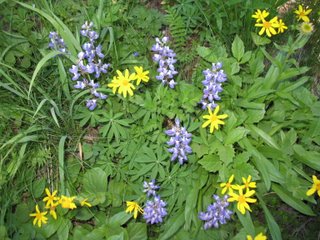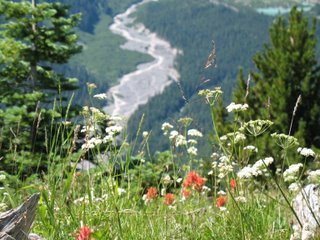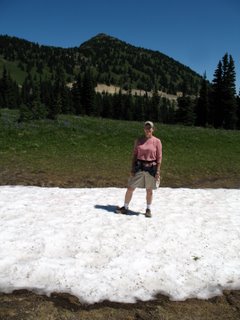This is the response I'm getting lately when I tell people what my plans are for my future endeavors. You know, way back in the late 70's when I was having my babies, I remember that breastfeeding was not so much in vogue and that having a "natural" childbirth was tantamount to living in the woods with no toilet. I relied heavily on my La Leche League friends to get me through the early days of nursing and adjusting to having a baby in the house. I thought "At least when my daughters begin to have their babies, times will have changed and everyone will be more knowledgeable and supportive of women's decisions to breastfeed and have their children the way they would like." Well, I perceive that there has been some progress in this area, but I'm really surprised that it hasn't progressed as much as I had hoped. Hence...the decision to become a part of the solution.
For those of you out there who may not, like my friends around here, know what a doula is...here's the short version. The term "doula" was coined by an author back in the 70's named Dana Raphael who wrote an outstanding little book entitled, "Breastfeeding: The Tender Gift". It was required reading for La Leche League leaders and my old copy is sitting on my shelf today. Doula is Greek for "slave" or "servant". The term connotes a person who is devoted to the care of the new mother either while she is giving birth, after she has given birth, or both. Since I'm embarking on my journey to become a certified postpartum doula, I've been doing some required reading on all types of birth and postpartum related subjects. Most interesting to me has been the historical look at how different cultures treat their new mothers after childbirth.
In most cultures, there is a "lying-in" period after the birth. An older woman or women in the community, most often a relative, comes and stays with the new mother and family and devotes herself to caring for them. Usually, this period is about 40 days. (similar to our 6 weeks postpartum period). However, all the reading that I've done stresses that there is no set time to postpartum. One book even said as long as the mom is breastfeeding and changing diapers, you are in postpartum. Anyway, the point being that the new mother is pampered. Someone else takes care of the day-to-day household responsibilites so that the new mother who has just done this tremendously important task of bringing forth new life gets the treatment that she deserves. Special meals are prepared to facilitate breastfeeding, herbal teas are made, massages for the mother and the new baby are given. In short, the mother is expected to rest and recover while others take complete care of her. Women are around to help her with breastfeeding, showing her how to do it. Contrary to popular belief, just because it is "nature's way" does not mean it comes naturally. It is a skill like anything else and has to be learned.
Wouldn't childbearing in the U.S. be much more enjoyable and less stressful if we were allowed to have this time? Instead, we give birth and are hustled out of the hospital ASAP and expected to go home and be supermom because all women just naturally know how to do this, right??? Well, that wasn't my experience. I was 21, never babysat, never even saw anyone breastfeed and there I was with a new baby...a howling new baby. If it hadn't been for a couple of women in LLL who were there for me, I probably would have lost my mind.
So, I'm curious about other women's experiences with postpartum. Did you prepare for it like you did for your birth experience? If not, why not? Would it have helped you? Did you experience an easy postpartum with your baby? If difficult, what do you think would have helped? Scott...I guess these questions won't apply directly to you, but as a new dad, did you perceive difficulties that maybe could have been avoided? What have you learned with subsequent children?
Thanks for any info you can give me on this subject. I'm very excited about becoming an active member of the childbirth community and hope to help families make this wonderful transition a little easier.
 These photos are taken at the most beautiful spot I've seen (so far) here in WA. This is the Sunrise trail on Mt. Rainier. There are many trails here to hike and these are photos from two of them. As I'm hiking, I'm trying to learn the flora of the area. I guess that's a hangover from my Botany class. The beautiful little flowers above are Mountain Lupine (purple) and Arnica (yellow). I would definitely add these to my garden, but they won't grow at a lower altitude. You have to hike to see them.
These photos are taken at the most beautiful spot I've seen (so far) here in WA. This is the Sunrise trail on Mt. Rainier. There are many trails here to hike and these are photos from two of them. As I'm hiking, I'm trying to learn the flora of the area. I guess that's a hangover from my Botany class. The beautiful little flowers above are Mountain Lupine (purple) and Arnica (yellow). I would definitely add these to my garden, but they won't grow at a lower altitude. You have to hike to see them. "The hills are alive..." No, I didn't burst into song, but felt like bursting into prayers of praise for the beauty around me.
"The hills are alive..." No, I didn't burst into song, but felt like bursting into prayers of praise for the beauty around me. Everywhere we walked we were looking at the scene above and below. What you see sort of in the center of the picture winding down the mountain is actually a glacier that feeds the White River.
Everywhere we walked we were looking at the scene above and below. What you see sort of in the center of the picture winding down the mountain is actually a glacier that feeds the White River.

 Yes, I am standing on snow pack--in July! This was a hike that I got sunburned on, and yet I was at a point where I could wash my face in snow.
Yes, I am standing on snow pack--in July! This was a hike that I got sunburned on, and yet I was at a point where I could wash my face in snow.







